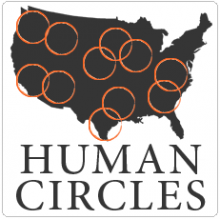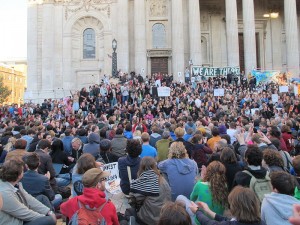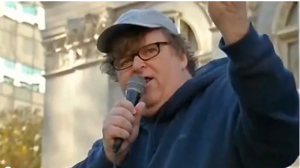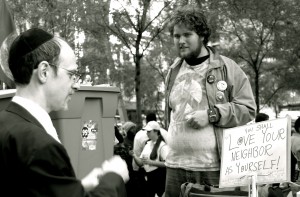Activism

The New York City Human Circle will be replicated throughout across the nation, when faith leaders host Human Circles as members of the Sojourners National Mobilizing Circle, which is bringing together faith and community leaders to organize faith-rooted actions in their communities.
The purpose of these circles is not only to lobby for the poor but also with them.
Whenever we harvest, prepare, and eat food in the context of community, we reenact that wondrous moment on the shores of the Sea of Galilee when Jesus took a few fish and two loves of bread and managed to feed 5,000.
But we can’t forget the whole story — Jesus fed everybody, surely even some folks who despised his message. After all, they were all God’s children, and they were hungry too. I can’t help but think that as they ingested the food, they took in his love too, and it changed them.
Still today, food is a great equalizer and bridge-builder. Who isn’t at least momentarily transformed by a perfect heirloom tomato or a slice of homemade pie?

Chris Hedges' statement on Occupy Wall Street read in part:
As part of the political theater that has come to replace the legislative and judicial process, the Securities and Exchange Commission agreed to a $550 million settlement whereby Goldman Sachs admitted it showed "incomplete" information in marketing materials and that it was a "mistake" to not disclose the nature of its portfolio selection committee. This fine was a payoff to the SEC by Goldman Sachs of about four days' worth of revenue, and in return they avoided going to court. CEO Lloyd Blankfein apparently not only lied to clients, but to the subcommittee itself on April 27, 2010, when he told lawmakers: "We didn't have a massive short against the housing market, and we certainly did not bet against our clients." Yet, they did.

This Sunday (11/6), is precisely one year from the 2012 General Election where the next U.S. President will be elected, and to mark the date, thousands of people from across the country plan to gather at the White House.
But we're not gathering to celebrate, have a sit-in, or even march in protest. Instead, we plan to surround the White House -- literally -- in a Circle of Hope that could be as large as a mile or more in circumference.
From our Circle of Hope we will call upon President Obama to reject the dirty-oil, Keystone XL pipeline Big Oil wants to build from the Canadian tar sands in the Alberta province 6,000 miles south -- straight through the American Heartland -- to the oil refineries along the Gulf Coast of Texas.
Occupy Wall Sreet, false idols and a moral economy. Breaking the cycle of poverty. Poorest poor in U.S. hits a new record: 1 in 15 people. As poverty deepens, giving to the poor declines. Arianna Huffington: Shakespeare, the Bible and America's shift into a punitive society. Peaceful Occupy Oakland march followed by late-night clashes.

When spurred on by God and conscience, there's no telling what trouble you might get into.
When I was ordained as a "Minister of Word and Sacrament" in the Reformed Church in America, a denomination that began in 1628, I imagined that I was being ordained to a church that was "reformed and always reforming!" (Emphasis mine).
Reformata et semper reformanda was a theme of the Reformation, which Martin Luther kicked off on Oct. 31, 1517 when he nailed his Ninety-Five Theses to front door of Castle Church of Wittenberg, Germany.
But rather than reviewing history from a half-millennia ago, let me explain what I hoped for 22 years ago, when I was ordained.

On Sunday (10/30), the Anglican Bishop of London, the Rt. Rev. Dr. Richard Chartres, met with Occupy London protesters who have encamped for several weeks now on the ground of St. Paul's Cathedral in London, in an ongoing attempt to get the demonstrators to leave church grounds.
Chartres wants the Occupiers to vacate cathedral property and stopped short, in an interview with the BBC yesterday, of saying he would oppose their forcible removal. Other British clergy, however, are rallying behind the demonstrators, saying they would physically (and spiritually) surround protesters at St. Paul's with a circle of prayer or "circle of protection."
In case you missed it...
In an OpEd titled, "What the Costumes Reveal," New York Times columnist Joe Nocera wrote about a Halloween office party thrown by the N.Y. law firm of Steven J. Baum, an outfit that specializes in real estate foreclosures -- a "foreclosure mill," if you will -- where, apparently, employees came costumed as homeless and foreclosed-upon families.

Filmmaker Michael Moore told anti-Wall Street protesters in Oakland that the Occupy movement -- which has spread to cities across America and overseas -- in inspiring millions who are angry about corporate excess, income inequality and the failure of politicians to address issues facing the majority of Americans.
"We've killed despair across the country and we've killed apathy," he said.
Watch the video of Moore's speech inside...
 We're in this thing together or we're not in this thing at all.
We're in this thing together or we're not in this thing at all.
We should all be marching in the streets.
We are the 100 percent.
We are poor. We are well-to-do. We are those somewhere in the middle. We are aware of the struggles and unfairness of this world and for this reason we are sensitive to one another's needs. So, we love our neighbors as ourselves.
What was most telling about the disagreement between the two men was their discussion of Luke 4. Mohler argued the passage should be understood in light of how he interpreted the preaching and teaching of Paul and the other apostles. This means that when Jesus said that he came to bring good news to the poor that good news was personal salvation.
Wallis argued that yes, personal salvation is one part of that good news, but that the other part is the Kingdom of God breaking into the world and transforming societal relationships as well. When the Gospel is proclaimed, it is good news for a poor person's entire being, community and world -- not just his or her soul.
First, it was encouraging to hear Mohler spend a lot of time emphasizing that working for justice is essential to fulfillment of the Great Commission. Throughout the night he repeated his concern that a lot of Churches are REALLY bad at making disciples who actually do the things Jesus told us to do. As the president of one of the largest seminaries in the world, it will be interesting to see if he is able to train a generation of pastors who will do things differently. My concern is that he is missing the connection between his theology and the failure of Christians to actually do justice.
The condition of former U.S. Marine and Iraq War veteran Scott Olsen, 24, who was badly injured when he was struck in the head reportedly by a projectile fired by police Tuesday night during Occupy Wall Street protests in Oakland, Calif., was upgraded from critical to fair condition overnight.
Did Jesus ever withhold love or healing for fear that he would give up too much of himself?
Did Jesus ever worry that the nature of God would change if he ate at certain tables, or touched certain kinds of people?
Of course not.
The Bible tells us that Jesus continually stepped out of the normative comfort zones of his day to extend his message of radical reconciliation.
I realized that my hesitation to embrace all people interested in an interfaith vision was mostly about my own fear, my own lack of faith. There was nothing Christ-like about it.
On Nov. 5 folks all over the world will divest from Wall Street and its banks … in order to invest in a better world.
Ideologies alone are not enough. There came a point in the movement to abolish slavery where ideology required responsibility. As one abolitionist said, “The only way to be a good slave-owner is to refuse to be a slave-owner.” To truly be against slavery also meant that you didn’t drink sugar in your tea, because sugar was produced with slave labor.
So on November 5, my wife and I will be joining the “Move Your Money” celebration, moving our money from Bank of America to the non-profit credit union here in Philadelphia.
It is one small step away from the vicious cycle that continues to see money transfer from the increasingly poor to the increasingly rich.
It is trying to take to heart Jesus’ command to “Get the log out” of my own eye.
It is a move towards Gandhi’s call to “Be the change you want to see in the world.”
It’s one little step towards being less of a hypocrite tomorrow than I am today.
Last weekend, I had the privilege of spending some time at the End Genocide Action Summit, which brought people from all over the world to Washington, D.C., to learn about and fight against genocide, particularly the ongoing genocide being waged by Omar al-Bashir against the people of Darfur, Sudan.
Finally, as President Obama has announced, this American war will soon be over, with most of the 44,000 American troops still in Iraq coming home in time to be with their families for Christmas.
The initial feelings that rushed over me after hearing the White House announcement were of deep relief. But then they turned to deep sadness over the terrible cost of a war that was, from the beginning, wrong; intellectually, politically, strategically and, above all, morally wrong.
The War in Iraq was fundamentally a war of choice, and it was the wrong choice.
"We don't have to engage in grand, heroic actions to participate in the process of change. Small acts, when multiplied by millions of people, can transform the world."
Last night 25 individuals were awarded the Freedom from Fear Award in Seattle at the National Immigrant Integration Conference. Contrary to news coverage we see day after day, these awards, sponsored by Public Interest Projects (PIP) show us courageous individuals who, to each their own capacity, are standing up to and fighting injustice.